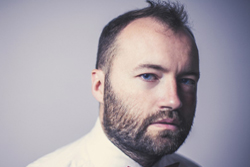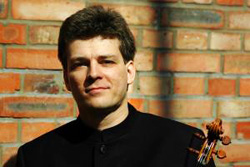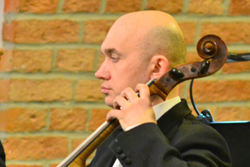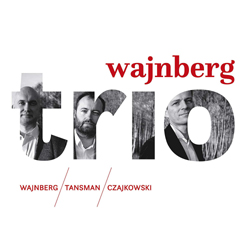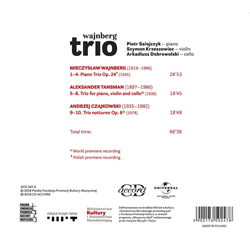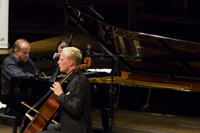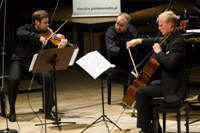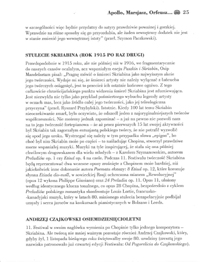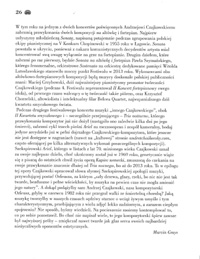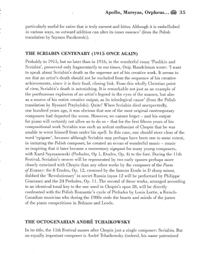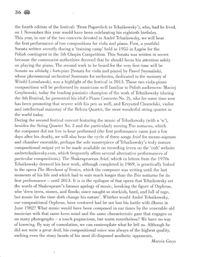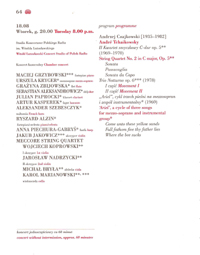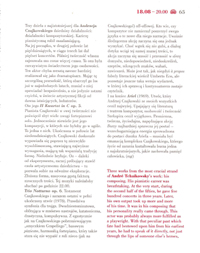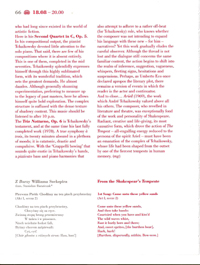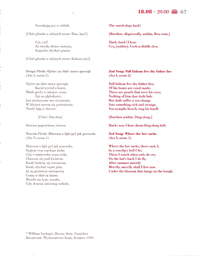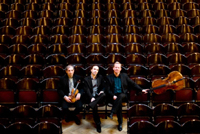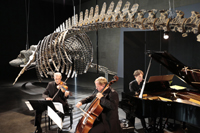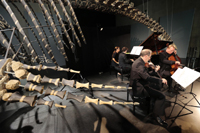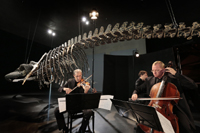|
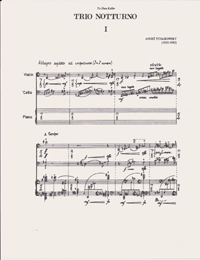
I - Allegro Agitato
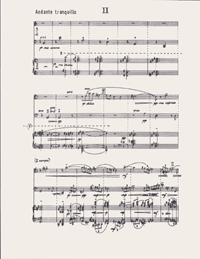
II
- Andante Tranquillo
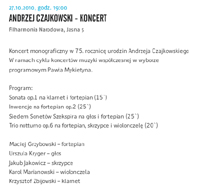 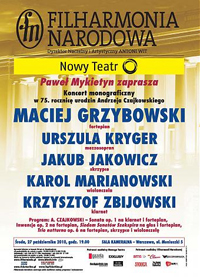
October
27, 2010
Performance in Warsaw
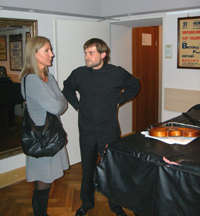
Jakub Jakowicz
in conversation after October 27, 2010 performance
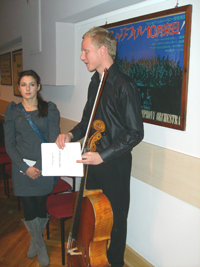
Karol
Marianowski in conversation after October 27, 2010 performance
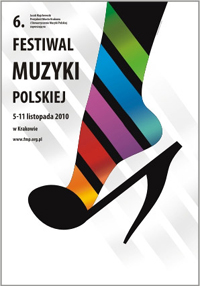
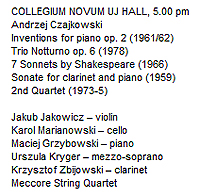
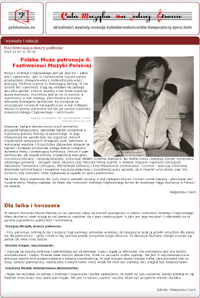
6th Krakow Festival
of Polish Music, November 6, 2010
www.polskamuza.eu
review by Malgorzata Czech (in Polish)
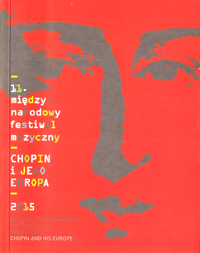
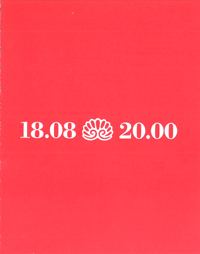
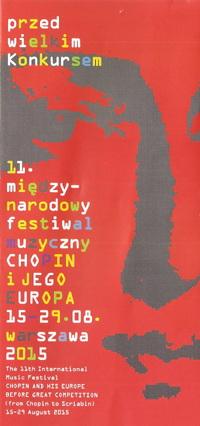
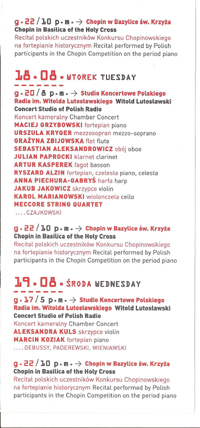
Warsaw -
August 2015
|
Trio
Notturno (1978) - Opus 6
This
webpage provides information about the André Tchaikowsky Trio
Notturno (1978) - Opus 6. This includes performances, music links (as
*.mp3 files) and then text that lists all known details regarding this
composition from the book, The Other Tchaikowsky - A Biographical
Sketch of André Tchaikowsky.
(2019)
Trio Notturno in Concert
From the New Zealand School of Muisc is a live recording of the Trio
Notturno. On piano, Gabriela
Glapska, the excellent Polish pianist who is playing this concert
as part of her PhD requiements. The other players are Monique
Lapins, Violin, and Ken
Ichinose, Cello. This performance was repeated on November
17, 2019 as part of a special musical event celebrating 75th anniversary
of The Polish
Children of Pahiatua, New Zealand. [Bonus
with the same performers: Panufnik,
Trio Opus 1 -and- Shostakovich,
Trio No. 2]
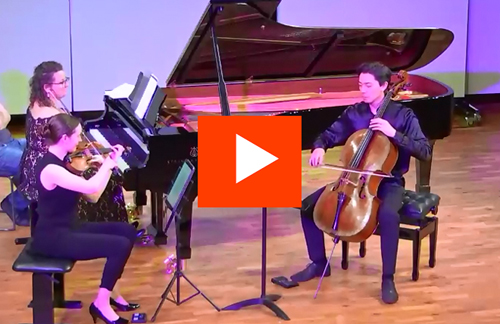
(2019)
Trio Notturno now on music CD
The
Polish trio, Wajnberg,
has announced their release of Accord ACD 247-2 CD that features the
Trio Notturno, Opus 6. The performers are: Piotr Salajczyk - Piano;
Szymon Krzeszowiec - Violin; and Arkadiusz Dobrowolski - Cello. The
trio has posted a brief YouTube video in support of the CD release -
Click
Here. This CD may be purchased on the Amazon.com website - Click
Here. A review of the Trio Notturno performance appears on the Art
Music Lounge website - Click
Here, which reads, in part, "This is an excellent recital,
well-planned and fascinating. Would that more modern-day classical instrumentalists
and chamber groups played such interesting and emotionally charged programs!"
For more information about the CD, the music and the performers, Click
Here and then Booklet Preview. For a review of the CD by Stephen
Greenbank for MusicWeb International, Click
Here.
(2018)
Trio Notturno in Concert
The
September 2018 concerts of the
Music Salon of the Polish Radio Choir at the Villa Decius included
a performance of the Trio Notturno on September 23, 2018, at 5 pm.
The performers were Maciej Suszycki - violin, Karol Marianowski -
cello, and Maciej Grzybowski - piano.
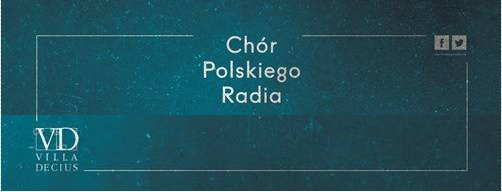
(2016)
Trio Notturno in Concert
As
part of the Tansman
Festival 2016, the Weinberg Piano Trio played the Trio Notturno
on November 22, 2016 at the Lodz
Museum. The performers were Szymon Krzeszowiec - violin, Arkadiusz
Dobrowolski - cello, and Piotr Salajczyk - piano.
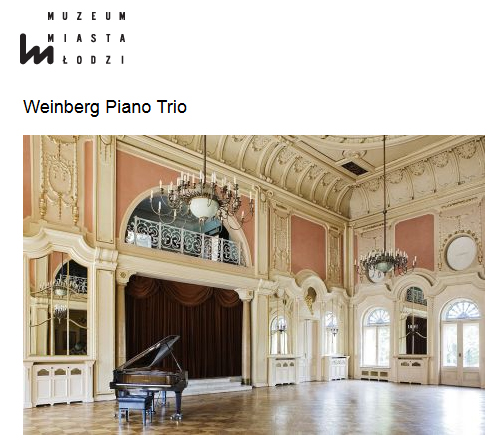
(2015)
Trio Notturno in Concert
The
Uniwersytet Muzyczny Fryderyka Chopina in Warsaw presented a concert
on October 26, 2015 that featured the Andrzej Czajkowski composition,
Trio Notturno. The performers were pianist Maciej
Grzybowski, violinist Jakub
Jakowicz, and cellist Piotr
Hausenplas. Click
Here for the program.
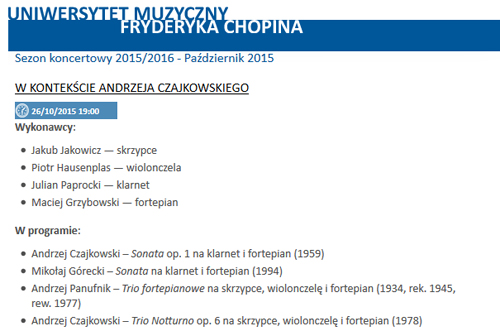
(2015)
Trio Notturno at the Chopin and his Europe Music Festival
The Trio Notturno was featured as part of the 2015 Chopin and his Europe
Music Festival in Warsaw, Poland. The concert date was August 18, 2015
with performers:
Piano -
Maciej Grzybowski
Violin - Jakub Jakowicz
Cello - Karol Marianowski
Images
from the concert and program appear below, along with music samples
from the concert.
Trio Notturno
- Complete / 00_op6_trio_waw_aug.mp3
Trio Notturno - 1st Mvnt / 01_op6_trio_waw_aug.mp3
Trio Notturno - 2nd Mvnt / 02_op6_trio_waw_aug.mp3
(2015)
Trio Notturno performance in Vienna
Famed ensemble the Altenberg Trio will be performing at the Musikverein,
Brahms Hall on 17 March 2015, where they will present works by Joseph
Haydn, André Tchaikowsky, Franz Schubert and Felix Mendelssohn-Bartholdy.
Click
Here for additional information. The Altenberg Trio preformed the
Trio Notturno previously in Bregenz, Austria. For more information on
this performance from July 2013, Click Here.
(2014)
Trio Notturno and the Arts @ Trinity
The same performers for the Leeds Symposium of November 2013 will once
again play the Trio Notturno, this time as part of the Arts @ Trinity
concert series. The date is December 5, 2014 and further information
may be found on the Trinty website (Click
Here)
|
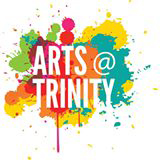
Venue
|
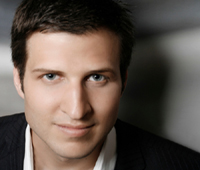
Nico
de Villiers
|
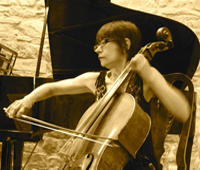
Alfia
Nakipbekova
|
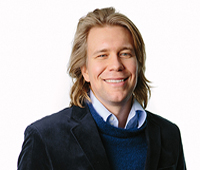
Sebastian
Müller
|
(2014)
Trio Notturno and the "Chamber Music with Piano" Conference
A featured work performed at the "Chamber Music with Piano"
conference on April 6, 2014, was the Trio
Notturno. The performers were Maciej Grzybowski piano, Aleksandra Kwiatkowska
violin, and Filip Syska cello. Kwiatkowska and Syska are students at the
Fryderyk Chopin University of Music in Warsaw.
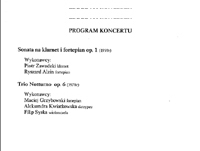
Program
|
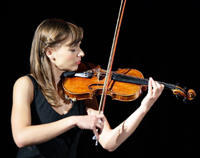
Aleksandra Kwiatkowska
|
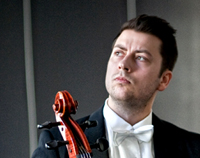
Filip Syska
|
(2013)
The Trio and the Leeds Symposium and Concert
André's biographer, Dr. Anastasia Belina-Johnson, who is also
a Head of Classical Music department at Leeds College of Music and a
member of LUCOS (Leeds University Centre for Opera Studies), organized
a concert on André Tchaikowsky's birthday (November 1st, 2013)
dedicated to his compositions (he would have been 78 years old).
The Trio Notturno Opus 6 was performed by Nico de Villiers
piano, Alfia Nakipbekova cello, and Sebastian Müller violin at
a symposium and concert honoring the 78th birthday of André Tchaikowsky
on November 1st, 2013. Click
Here to learn more about this symposium and concert. Click
Here (pdf) to read Nico de Villers' comments on André Tchaikowsky.

Nico de Villiers
|

Alfia Nakipbekova
|

Sebastian Müller
|
(2010)
The Trio and the Polish
Celebration Performances
While other performances have taken place in Poland featuring Maciej
Grzybowski (piano), Marcin Suszycki (violin), and
Karol Marianowski (cello), two special performances celebrating
the 75th Anniversary of the birth of André Tchaikowsky (Andrzej
Czajkowski - November 1, 1935) took place in October (Warsaw) and November
(Krakow) 2010. For these performances, Jakub
Jakowicz was violinist.
Of the
November 6, 2010 concert, Malgorzata Czech wrote for www.polskamuza.eu:
Andrzej
Czajkowski music was his fate - full of pain and loneliness. It is
also music very well thoughtout and composed with mathematical precision.
Polyphony is a dominant texture of this music of pain and loneliness,
which could tear apart the soul of the listener, plus it put enormous
technical requirements on the performers. Yesterdays monographic concert
at the Jagiellonian University’s Collegium Novum brought a level
of performance equal to the level of Andrzej Czajkowski's composing
skills - Masterful.
These
wonderful artists of the younger generation, composed of Jakub Jakowicz
(violin), Karol Marianowski (cello) [and Pianist Maciej Grzybowski]
played the Trio Notturno cleanly with precision and with perfect synchronization,
all within a mutual sense of spontaneity.
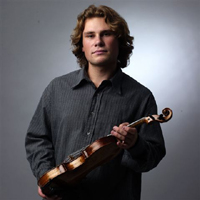
Jakub Jakowicz
|
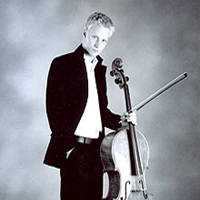
Karol Marianowski
|
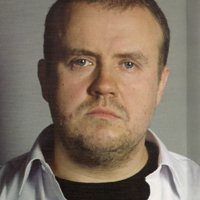
Maciej Grzybowski
|
(2013) Music/MP3
One of the 2013 Bregenz Festival "KAZ"
concerts featured the playing of André's Trio Notturno by the
Altenberg Trio (website)
in Bregenz, Austria on July 30, 2013. The setting was at the stunning
Kunsthaus
Bregenz. Click
Here for a review (Internet link) or Click
Here for a review (PDF File), both of which are in German.
Altenberg
Trio - Christopher Hinterhuber, Piano - Amiram Ganz, Violin - Christoph
Stradner, Cello
Trio Notturno
- Complete / 00_op6_trio_altenberg.mp3
Trio Notturno - 1st Mvnt / 01_op6_trio_1st_altenberg.mp3
Trio Notturno - 2nd Mvnt / 02_op6_trio_2nd_altenberg.mp3
YouTube
Link for a sample of 2nd Movement - Click
Here
(2004)
Music/MP3 [Webmaster "Best Recording" Pick]
The occasion for this trio performance was the 7th Polish Radio Music
Festival from May 18, 2004. The concert took place at the Polish Radio
"Szymanowski Hall."
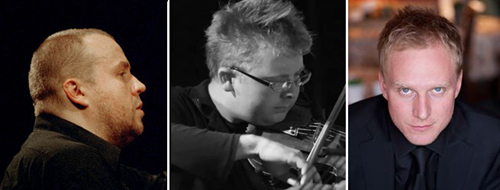
Festival Trio - Maciej Grzybowski, Piano - Marcin Suszycki, Violin -
Karol Marianowski, Cello
Trio Notturno
- Complete / 00_op6_trio_complete_2004.mp3
Trio Notturno - 1st Mvnt / 01_op6_trio_1st_2004.mp3
Trio Notturno - 2nd Mvnt / 02_op6_trio_2nd_2004.mp3
(1985)
Music/MP3 (1985)
The Capricorn Ensemble performance is from a Wigmore Hall performance
on November 11, 1985 as part of the Josef Weinberger Centenary Concert
Series.
Capricorn
Ensemble - Julian Jacobson, Piano - Elisabeth Perry, Violin - Timothy
Mason, Cello
Trio Notturno
- Complete / 00_op6_trio_capricorn.mp3
Trio Notturno - 1st Mvnt / 01_op6_trio_1st_capricorn.mp3
Trio Notturno - 2nd Mvnt / 02_op6_trio_2nd_capricorn.mp3
(1982)
Music/MP3
The trio was dedicated to the musicians in this recording. The performance
is from the July 4, 1982 Cheltenham Festival. Another
performance by Frankl-Pauk-Kirshbaum took place at the Coolidge Auditorium
of the Library of Congress, Washington, D.C., Dec. 13, 1985 (Click
Here for information).
"A
Study in Contrast" program included a segment about the Trio Notturno.
For the entire "A Study in Contrast" program, see the Miscellaneous
link above. Voices for the following: David Owen Norris, Peter Cropper,
Judy Arnold, Stephen Kovacevich, Terry Harrison, André Tchaikowsky.
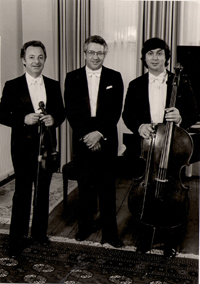
Frankl/Pauk/Kirshbaum Trio
Peter Frankl (piano), Gyorgy Pauk (violin) and Ralph Kirshbaum (cello)
A Study
in Contrast / contrast_trio.mp3
November
1, 1985 Introduction / 00_op6_trio_bbc_intro.mp3
Trio Notturno
- Complete / 00_op6_trio_frankl.mp3
Trio Notturno - 1st Mvnt / 01_op6_trio_1st_frankl.mp3
Trio Notturno - 2nd Mvnt /02_op6_trio_2nd_frankl.mp3
|
|
This
performance is on YouTube. Click
Here (opens new window) |
Music
Publisher
This
work is
published by Josef
Weinberger and appears in their catalog of André Tchaikowsky
published works. Click Here
for a PDF copy of the André Tchaikowsky Weinberger catalog.
From
the biography The
Other Tchaikowsky
André
was not to hear the world premiere of his Trio Notturno, which was given
just nine days after his death. Peter Frankl, as the pianist in the
Frankl-Pauk-Kirshbaum Trio, wanted something for his ensemble, and in
1976 asked André for a composition. The full name of the work
came from an exchange of letters with Terry Harrison. André wrote
on April 29, 1976:
This
summer I shall at last try to combine both activities: get up late,
breakfast at lunchtime, practise right through the afternoon, walk
out in time to catch the sunset, then compose at night, till 1 or
so. Do you approve of the scheme? Will it work?
Terry replied
on May 10, 1976; ”I
think if your next piece is going to be called, 'Notturno,' then your
summer schedule sounds fine."
So the
name "Trio Notturno" was given to an as yet non-existent composition.
André wasn't sure he wanted to compose the Trio, and worse, it
had a deadline: 1978. In a letter to a close friend, André described
the history of his trio:
I have
promised to tell you the story of my piano trio, but the chaos of
the AFH [André's acronym representing Christmas, to him the
Annual Festival of Hypocrisy] has prevented me from doing virtually
anything I wanted while compelling me to do or to fake most of the
things I detest. Now I realize why people really enjoy New Year's
-- it's a direly needed relief from the preceding collective convulsion.
Anyway, here goes.
For several
years Peter Frankl had kept at me to write a trio for him, Gy6rgy,
and Ralph. And having not a scrap of an idea for it and precious little
inclination to write anything to order, I kept saying, "I'm trying!,"
which seemed vague enough to keep me safe. I had reckoned without
the Hungarian spirit.
In summer
of 1977 Peter and Annie came down to lunch, praised the food and took
every joke seriously, and I felt the occasion was quite a success.
That impression changed when Peter asked to see how I was doing with
the trio:
"Surely
after all this trying you must have something to show me?"
"Of
course I have," I lied, "but no one but myself could possibly
read my writing."
“Well,
then, play it to us.”
Seeing
no way out, I played Jessica's aria from "The Merchant,"
which I had just written. Peter was very impressed: "It's just
right for us. Marvelous." Indeed, I'd have given a lot to hear
them sing it.
Then
last January [1978] my second string quartet was premiered in Misha
Donat's Smith Square series. Peter rang him at once: "Misha,
if you liked André's quartet, I can assure you that his trio
is even better. I heard it myself." Misha gave them a date for
the first performance, February 19, 1979.
It was
my turn to grab the phone: "Misha, my piano trio is quite wonderful.
It has every virtue, except existence. Such perfection is too good
for this world."
Misha
was not amused: "Well, you better write it now. I've placed it
and publicized it, and if it doesn't come off, I shall lose face."
“What
about my face? I’ve been looking everywhere.”
“Try
manuscript paper.”
So I
tried, grumbling at having to shove the Merchant aside. By late August,
the trio was ready. I told Peter. "Marvelous." But he confided
in Radu that he was really extremely embarrassed: "You see, Gyorgy
and Ralph don't know that I've asked André to write this trio,
and it may be difficult to persuade them to learn it." Now, I'm
not supposed to know this, or Radu would be on the spot. But I'm greatly
interested to see how our Machiavelli gets himself out of this. Or
the others in. At least Misha has postponed the date.
André
guessed right: Peter was all for the trio, but Gyorgy and Ralph were
hesitant. They wanted to wait for the right venue and it wouldn't be
at St. John's, Smith Square, in February 1979. All André's speed
to produce the composition had been needless; yet, it demonstrated that
the absence of his usual agonizing punctilliousness and the presence
of more spontaneity gave a certain luster to the trio that was lacking
in his more carefully written compositions. The result was André's
most often-played composition.
The inspiration
for the form of the Trio came from Hans Keller, to whom the Trio was
dedicated, as André relates in his own program notes:
Trio
Notturno - Opus 6
Some
years ago Hans Keller gave a lecture at Dartington about the basic
incompatibility of piano and strings. Classical harmony, he explained,
used to bridge the gap. With the decline of tonality it became all
but impossible to blend the disparate sounds. "All right, Hans,"
I said, "if ever I write anything for piano and strings it shall
be dedicated to you."
And so
it is. When Peter Frankl asked me to write for his trio, I naturally
remembered Hans Keller's warning -- or challenge -- and my promise.
I decided to tackle the problem head on by emphasising the disparity
of the instruments. This in turn led me to conceive the whole work
as a study in contrast, and I did all I could to increase the polarity
of the two movements.
Thus
the Allegro is a movement of extreme rhythmic irregularity, full of
short abrupt phrases and swift changes of register, with a preference
for the dark low notes of the piano, while the Andante is a calm lyrical
movement without a single change of metre, full of flowing melodic
lines and clear, crystalline harmonies. And, lest the contrast thus
attained prove too "pat," I wrote an agitated central section,
culminating in the climax of the entire work and followed by a sudden
silence, a shortened recapitulation and a long, static, reminiscent
coda. It is as if Florestan had briefly invaded Eusebius' territory,
before being finally subdued. [A reference to Robert Schumann's two
opposing literary personalities.]
The first
official performance of the trio did not take place until July 4, 1982
at the Cheltenham Festival, under circumstances that none could have
predicted. For The Daily Telegraph, Peter Stadlen wrote on July
6:
The audience
stood in silence after the first public performance of "Trio
Notturno" at the Town Hall, Cheltenham, to honour the memory
of the composer André Tchaikowsky, who died last week. In fact,
Peter Frankl, piano, Gyorgy Pauk, violin, and Ralph Kirshbaum, cello,
had already played the work at the funeral of the 46-year-old pianist-composer,
Polish-born and not related to his Russian namesake.
The Trio
is dedicated to Hans Keller, who had insisted that it was impossible
to blend the disparate sounds of piano and strings in atonal music.
Certainly Tchaikowsky made his point with the delicately wrought textures
of the Trio, an affecting piece and not only because it has turned
out to be his own requiem, as did Mozart's.
William
Mann wrote for The Times:
Alarmingly
Brilliant Feat of the Imagination
The premiere
was also, alas, a farewell in the case of the Trio Notturno by André
Tchaikowsky, who died just over a week before its first performance
on Sunday night. The composer, no relation to his great Russian namesake,
was Polish born, took British citizenship and was much admired here
as a pianist. He wrote the work expressly for the admirable piano
trio of Peter Frankl, Gy6rgy Pauk, and Ralph Kirshbaum, who dedicated
their concert to his memory.
Tchaikowsky
gave them a tough assignment. Having pledged himself to balance anew
the unwieldy, sometimes inequitable, partnership of violin and cello
with modern grand piano, he proposed a linear basic texture, its outlines
ornate, almost baroque, rich in harmonic density, passionately argumentative
in expression. The two abruptly contrasted movements challenge instrumental
virtuosity at every turn; they might have sounded simply hard going,
but were revealed, with formidable cogency, as invigorating to play,
and listen to, especially in the rapid middle section of the second
movement, an alarmingly brilliant feat of imagination.
André
Tchaikowsky was one of the nicest musicians you could hope to meet,
and not the least eccentric. [A minority opinion] A pianist by reputation,
he was an increasingly ambitious composer and had all but completed
a full-length "The Merchant Of Venice" opera when he died
just over a week ago. Another recent composition was a Trio Notturno,
commissioned by Gy6rgy Pauk, Ralph Kirshbaum and Peter Frankl for
a first performance at the Cheltenham Festival in a concert which,
in the unhappy circumstances, became a memorial to the composer.
Textural
considerations are paramount in the Trio Notturno. It was inspired
by an allegation (from the ever-provocative Hans Keller, to whom the
work is dedicated) that piano and strings are basically incompatible.
André Tchaikowsky approached the problem in much the same way
as Bartok did in the two mature violin sonatas, emphasising the differences
rather than attempting to effect a compromise.
The Trio
Notturno is thus not the most comfortable work written for violin,
cello and piano. It is, however, despite its echoes of Bartok, one
of the most original and personal of its kind. The silence observed
by the audience at the end --although the composer himself might have
preferred applause to reward an admirably dedicated first performance
-- was an appropriate reaction to a work of such integrity.
When the
Trio Notturno was played in London in December 1982, Desmond Shawe-Taylor
wrote for The Sunday Times on December 16:
The Frankl/Pauk/Kirshbaum
Piano Trio gave the first London performance of the André Tchaikowsky
"Trio Notturno" which they had introduced at Cheltenham
last July. A second hearing confirmed my impression that the notable
pianist was also a composer of real promise, perhaps achievement,
although the sharp contrast between the writing for strings and keyboard
intended as a riposte to the assertion of Hans Keller (dedicatee of
the work) that modern harmony had rendered them incompatible -- was
less extreme than he must have intended.
The Trio
Notturno is firmly placed in the Frankl/Pauk/Kirshbaum repertoire and
they have played the trio worldwide from Israel to Australia to America.
Other trios have performed the work in concert including violinist Daniel
Phillips, cellist Carter Brey and pianist Edward Auer at the Sante Fe
Chamber Music Festival on August 9, 1983, and by the Capricorn Ensemble
on November 10, 1985 at Wigmore Hall in London. The Frankl/Pauk/Kirshbaum
US Library of Congress performance on December 13, 1985, was broadcast
on National Public Radio. The Trio Notturno was published by Josef Weinberger
in 1982.
|














